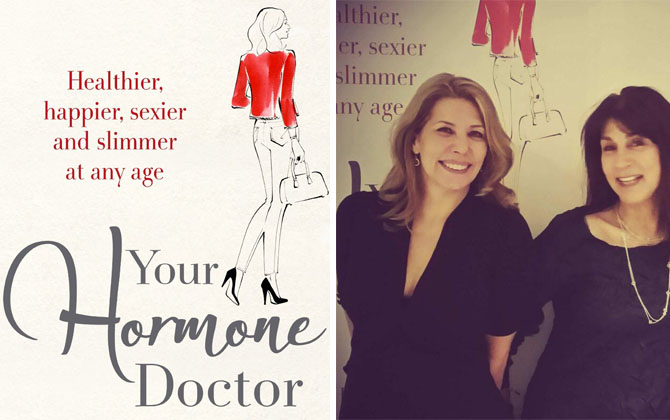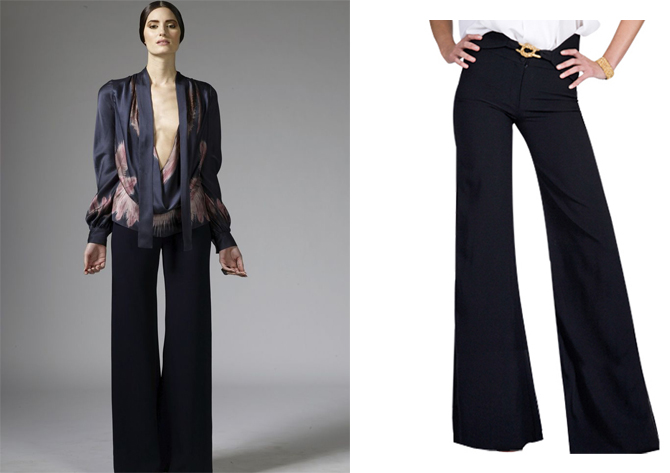 We were really excited when we heard about this new book written by Leah Hardy and Susie Rogers. Your Hormone Doctor is an honest, witty and really useful for women on how to de-stress, sleep better, re-ignite their sex lives, feel more confident, eat well and take control of their Hormones.
We were really excited when we heard about this new book written by Leah Hardy and Susie Rogers. Your Hormone Doctor is an honest, witty and really useful for women on how to de-stress, sleep better, re-ignite their sex lives, feel more confident, eat well and take control of their Hormones.
We caught up with Leah at the book launch to ask a few questions about how the book is relevant to women our age.
Is this a book aimed at menopausal women or can anyone read it?
Absolutely, any woman can read this book. Hormones affect every aspect of our bodies. From our mood to our waistline, from the strength of our bones to our sex drive, from our skin to our metabolism. Without hormones, we’d all be dead! We do focus on the specific hormone shifts that occur as read mid-life. Because if there is one thing that’s certain in our lives, and that’s that if we are fortunate to live long enough, we will all go through the menopause. Also, for most women the menopause is more of a journey than an event. The peri menopause is the time of hormonal shifts leading up to the menopause proper and it can last up to a decade. In the book we outline the kind of changes you might experience, and why they happen. We also talk about the hormones that affect us all, all of the time, such as the effect of insulin and hunger and satiety hormones on our bodies, how food and exercise affect our hormones, and much more.
What did you find were the main misconceptions around the menopause when writing the book?
That the menopause is always awful. That HRT kills you. That women get less happy as they get less fertile and that hormones are just things that happen to us, and over which we have no control.
Yes, you obviously can’t prevent the menopause, but how we experience it can be hugely affected by our lifestyle. All the evidence is that women’s happiness tends to increase post-menopausally, and that often includes their sex-life. The new evidence is that the right hormones, given to the right women at the right time, are not only safe, not only ameliorate menopausal symptoms, but can also save women’s lives.
Why do you think there is little or no useful information for menopausal women?
The menopause has traditionally been a taboo subject. Why? I’d guess because a woman used to be written off at a certain age, when she ceased to become a sexy, fertile, ovulating babe. No wonder nobody wanted to admit to getting older. It’s also about periods, something we’ve never been good at talking about.
But we are becoming much more open about all aspects of health that used to be considered shameful, from cancer to mental health, and I think the menopause is also losing its stigma. Partly because there are so many of us menopausal and peri menopausal women about.
Right now one in four women in the world is over 50. In five years that’s going to be one in three of us. And look at the way menopausal women command the world stage, such as Hillary Clinton and Angela Merkel. The other day I noticed that even the covers of glossy mags were dominated by women over 40, such as Cate Blanchett, Nigella Lawson, and Mary Berry. The under 40s were represented by Kate Moss and Kate Winslet, both of whom are nearly there.
What do you feel about the backlash against the term anti ageing, do you think women want to look and feel younger or just better?
Anti ageing is a pretty negative term. Of course nobody’s really against getting chronologically older. It’s always better than the alternative. But how you age is more malleable than you might think. I’m not just talking about looks. Anti-ageing can mean wanting to be as fit, strong, healthy and energetic as you were when you were young, rather than becoming creaky, stiff and weak. Of course, you don’t have to be chronologically young to be all of those things.
My mother is in her seventies and is still a Pilates teacher and professional dancer. She regularly appears on stage at the Royal Opera House alongside dancers who are literally 50 years younger than she is.
Maintaining youthful levels of bone density and muscle strength through healthy living is anti-ageing. Great posture is anti-ageing. Strength, suppleness and easy movement is anti-ageing. These things are totally possible for most of us for a long time if we live healthily. This is the aspect of anti-ageing that has become increasingly important to me as I’ve left my 40s behind.
Studies show that appearance is just as important to women over 50 as under 50. However, we aren’t stupid. Most of us know that no treatment, not even the scalpel or syringe, will make a 50 year old be mistaken for a 25 year old. If that’s your goal, you’ll just end up looking ridiculous (naming no names).
Looking as good, fresh and healthy as possible for the age that we are is a far more sensible goal that most women share. Great skincare, or even a bit of Botox, sensibly, cautiously and professionally done, can help with that. Many women over 50 feel incredibly youthful and positive on the inside and want their faces to reflect that.
Personally, I am just as interested in make up, clothes and shoes. My idea of sensible shoes are Converse. I’m not ready for elastic-waist trousers just yet, and I will not be stopping dying my hair anytime soon either. While I can see the many advantages of less time spent covered in foils at the hairdresser, I can’t go grey before my mother does!
What are the key things menopausal women need to consider to get through the menopause positively?
Exercise makes a huge difference. It balances hormones, helps control blood sugar, lifts your mood, cuts hot flushes, maintains bone density, makes you feel lithe and springy, and helps keep you sane. I think it’s non-negotiable if you want to age healthily, or as Oprah says, ‘magnificently’. Fortunately you don’t have to do too much to reap the benefits. Hate running? Walk and do yoga instead. I was the classic schoolgirl who hated PE, but I’ve fallen in love with exercise as I’ve got older. Right now I’m enjoying using weights to get stronger. Exercise also helps me sleep.
The right food is so important. Not just for maintaining a healthy weight, but for maintaining optimum hormonal health. I’m not talking about living on kale smoothies and quinoa (ugh) but reducing sugar, eating soluble fibre in greens and fruits for great gut health, choosing oily fish for essential fats, and good protein. I don’t believe in cutting anything out if it makes you miserable. We only have so much will power, and life is short. My non-negotiables include coffee (which is actually good for you) and wine (though too much makes sleep tricky and hot flushes inevitable, sadly). Other people might be miserable without cake.
Sleep! Ah how it knits the ravelled sleeve of care, and, it improves our hormonal balance too. Sleep can be elusive for women in mid-life. One GP told me insomnia was the number one reason that 50ish women came to see her. We include tips to help women sleep better in the book. I use supplements that have really helped me.
Reduce stress. Stress worsens every unpleasant menopausal symptom, from mood swings to hot flushes. It does terrible things to our hormones, raising cortisol which makes us fat and sick, lowering testosterone, and raising insulin. I know we all have difficulties in our lives. Women in mid-life often have caring responsibilities for children, elderly parents, or sick partners, and that’s hard work. We have our careers, perhaps health issues of our own. But we absolutely must try to find a way to keep our stress levels as low as possible. That might be by trying meditation or mindfulness, practising yoga, walking the dog or reading in bed. We deserve to be taken care of too, so be kind and compassionate to yourself.
Perhaps our most important message is that going through the menopause healthily doesn’t mean you have to live on kale smoothies and be miserable. We were absolutely determined not the make the book naggy, preachy or unrealistic. It turns out the single thing that makes women live healthier longer is good social interaction – aka having fun with people you like. Personally, when researching this book, I was most surprised by how much the brain controls the body – what we think can even improve our eyesight.
Attitude is everything when it comes to living well in mid life and beyond. Be passionate, curious, try new things, have new enthusiasms. Don’t diss the young, don’t whinge and complain about petty ailments. Experience gratitude. Live in the present but look forward to the future.
We couldn’t have put it better ourselves Leah – it’s really worth buying this book, whether you are menopausal or not, as there is lots of useful advice for women at any age.





Thank you Jane for posting about this book, some of the books I’ve read on the menopause are really life sapping. I’m going to order a couple of copies of this book.